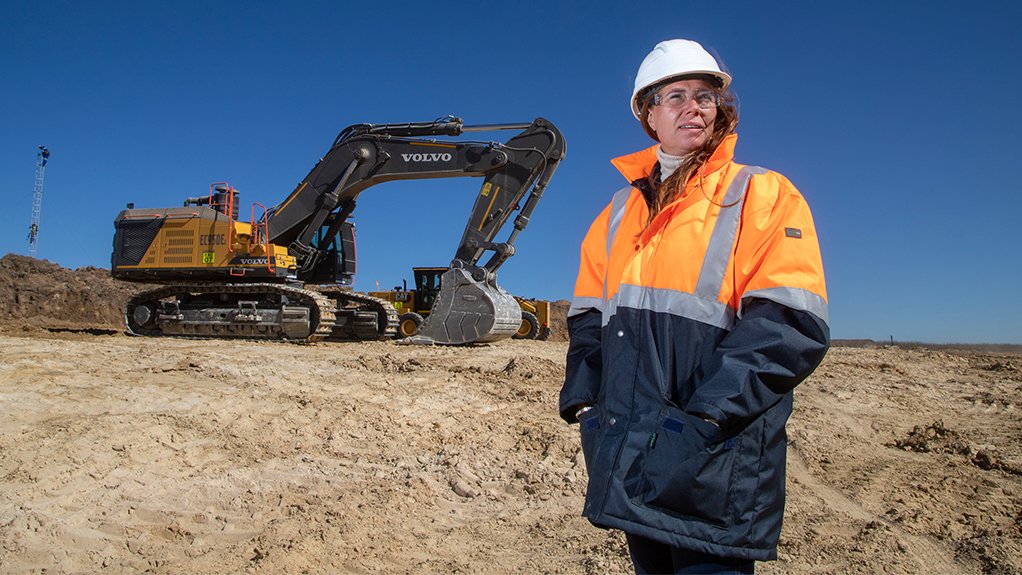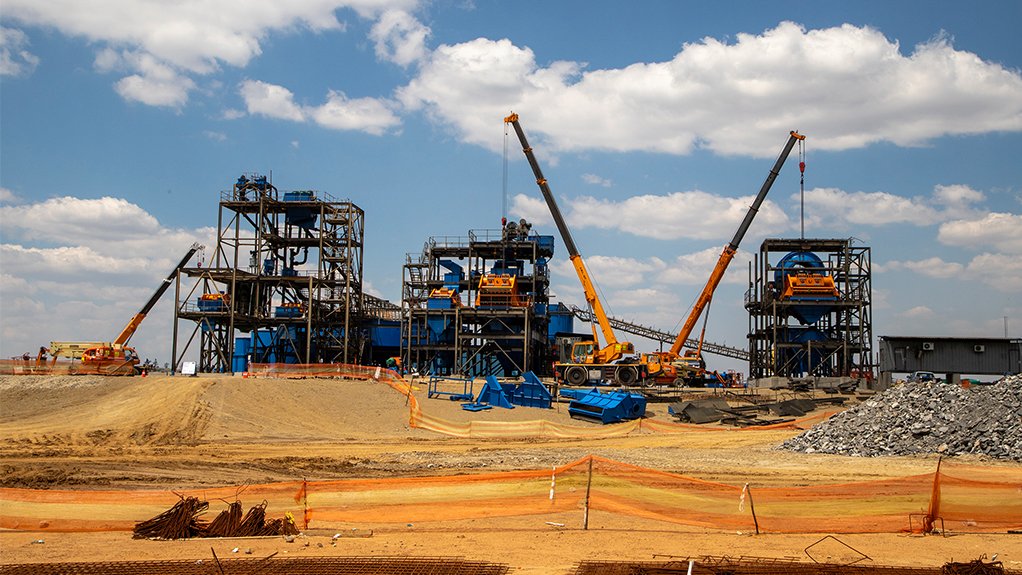Greenfield project nears full-scale mining



JARMI STEYN Canyon Coal has trained 40 locals with the skills required to operate the mine’s excavators, articulated dump trucks and dozers
REUSE OF OLD PROCESSING PLANT Procured from the depleted Hakhano mine, a 400t/h processing plant was refurbished and transported to the Gugulethu processing plant, where it is being reassembled and fitted with a filter press
The development of the Gugulethu Colliery – a greenfield project located to the southeast of Hendrina and proximate to Davel – is taking place at an “opportune time” as export opportunities for coal miners are opening in emerging Asian markets, says Gugulethu Colliery GM Jarmi Steyn.
She adds that the high-quality washed coal anticipated to come from Gugulethu Colliery will be “perfect” for global markets.
With operations in Gauteng and Mpumalanga, coal explorer, developer and processor Canyon Coal – a division of diversified mining investment company Menar – brought Gugulethu Colliery, formerly known as De Wittekrans, out of business rescue and is currently undertaking development of the project in two phases.
The first phase comprises establishing the opencast pit, with development of the opencast phase currently being at an advanced level, according to Steyn.
The opencast section consists of three pits, with the smallest designed to provide access to the underground portion of the Gugulethu mine – the development of which will take place in Phase 2.
“The development of the mine is at an advanced stage and we have already started mining the main pit after initially opening the boxcut just over six months ago,” she explains.
“At the moment, we are mining the B and C seams but will only start moving the coal once the construction is finalised. Once this is achieved, we can start working towards our 200 000 t a month production,” explains Steyn.
The mine’s development has been scheduled in a manner that will ensure a smooth transition between opencast and underground mining, with intentions of removing as much lag in production as possible.
“In approximately five years, we will start developing the underground section so that it already starts producing while the opencast is depleted in seven years,” she notes.
Steyn also informs Mining Weekly that at the start of construction work, the road leading up to the area where the processing plant is being erected, was constructed.
The 400 t/h processing plant, procured from Canyon Coal’s depleted Hakhano mine – the company’s first opencast colliery – was refurbished and transported to the Gugulethu Colliery, where it is being re-assembled and fitted with a filter press with sufficient capacity to process the slurry emanating from the mine more efficiently.
In addition, heavy mining equipment started arriving at the mine earlier in the year, with fleets currently being established on site. This equipment includes Volvo articulated dump trucks (ADTs) and excavators, and Caterpillar dozers and 140-series graders.
She notes that the construction of infrastructure, including the offices and changing rooms, recently started, with Gugulethu Colliery’s human resources team being on site to aid in the ongoing recruitment of mining personnel, ensuring that there will be skilled individuals on the team to meet the operational needs of the mine, as production ramps up.
Worthy Investment
The estimated life-of-mine for Gugulethu Colliery is in excess of 20 years, with a production rate of about 200 000 t a month.
The current openpit reserve estimate for Gugulethu Colliery stands at 14.3-million tonnes.
Steyn states that Canyon Coal believes that its investment into a project such as the Gugulethu Colliery reveals that, despite several challenges faced by the South African economy, it is still possible to invest in new mining projects – a factor evidenced by President Cyril Ramaphosa’s endorsement of the project in 2023 at the country’s yearly Investment Conference.
She explains that the Gugulethu Colliery project was “developed from scratch” and has been able to reach significant milestones in under 12 months, adding that, given the economic climate, the project will contribute towards helping to alleviate unemployment in rural Mpumalanga.
Project Drawcards
Steyn points out that outside of operations, Canyon Coal has connected with the local community through the establishment of a community forum, having hosted a procurement event earlier in the year to introduce the company and its procurement processes to local companies.
In addition, the company has trained 40 locals in the skills needed to operate the mine’s excavators, ADTs and dozers. These operators joined the existing permanent employees of Gugulethu Colliery on December 1, at which point their training programmes were completed.
Further, the first interns from a variety of fields were introduced to the mine in this process as well.
Progressing into 2024, Canyon Coal will focus on completing the remaining establishment of mine plant, ensuring that it will be ready for the production of the first washed product within the first quarter of 2024, as planned.
She adds that with the anticipation of production in the first quarter of 2024, the cold commissioning of the plant without coal will be done first to assess whether the water balance is adequate, and if the mechanical components and interfacing are functioning well. This will be followed by the hot commissioning of the plant, whereby it will be run with coal ore.
Steyn notes that the mine is aimed at the production of a single product for the export market, but has the capacity to produce a variety of sized products as well.
Gugulethu’s product will be trucked about 43 km to the Rietkuil rail siding for loading onto rail wagons, after which it will be destined for the export market through the Richards Bay Coal Terminal (RBCT), in KwaZulu-Natal.
All of Canyon Coal’s export allocation at the RBCT is in use, but capacity for Gugulethu’s tonnages will free up when the company’s 1.4 million-tonne-a-year Phalanndwa Colliery, in Delmas, closes in the near future as it reaches the end of its life.
Canyon also has export allocations at the Grindrod Terminal de Carvao da Matola port, in Maputo, Mozambique.
Article Enquiry
Email Article
Save Article
Feedback
To advertise email advertising@creamermedia.co.za or click here
Press Office
Announcements
What's On
Subscribe to improve your user experience...
Option 1 (equivalent of R125 a month):
Receive a weekly copy of Creamer Media's Engineering News & Mining Weekly magazine
(print copy for those in South Africa and e-magazine for those outside of South Africa)
Receive daily email newsletters
Access to full search results
Access archive of magazine back copies
Access to Projects in Progress
Access to ONE Research Report of your choice in PDF format
Option 2 (equivalent of R375 a month):
All benefits from Option 1
PLUS
Access to Creamer Media's Research Channel Africa for ALL Research Reports, in PDF format, on various industrial and mining sectors
including Electricity; Water; Energy Transition; Hydrogen; Roads, Rail and Ports; Coal; Gold; Platinum; Battery Metals; etc.
Already a subscriber?
Forgotten your password?
Receive weekly copy of Creamer Media's Engineering News & Mining Weekly magazine (print copy for those in South Africa and e-magazine for those outside of South Africa)
➕
Recieve daily email newsletters
➕
Access to full search results
➕
Access archive of magazine back copies
➕
Access to Projects in Progress
➕
Access to ONE Research Report of your choice in PDF format
RESEARCH CHANNEL AFRICA
R4500 (equivalent of R375 a month)
SUBSCRIBEAll benefits from Option 1
➕
Access to Creamer Media's Research Channel Africa for ALL Research Reports on various industrial and mining sectors, in PDF format, including on:
Electricity
➕
Water
➕
Energy Transition
➕
Hydrogen
➕
Roads, Rail and Ports
➕
Coal
➕
Gold
➕
Platinum
➕
Battery Metals
➕
etc.
Receive all benefits from Option 1 or Option 2 delivered to numerous people at your company
➕
Multiple User names and Passwords for simultaneous log-ins
➕
Intranet integration access to all in your organisation


















